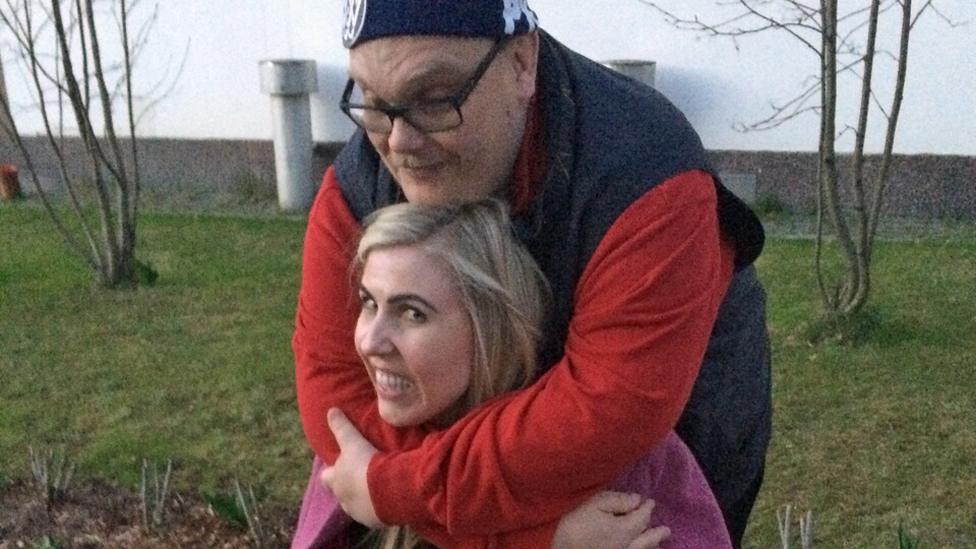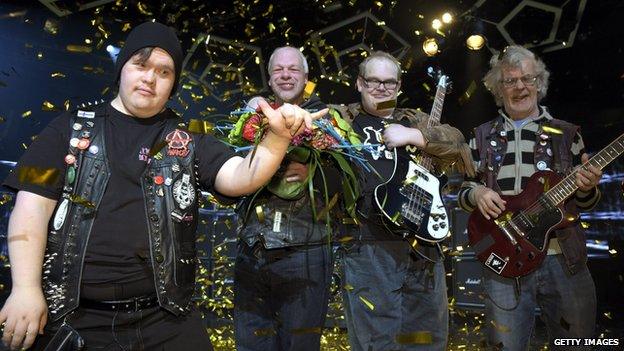Never mind the learning disability, here's PKN
- Published
Sami Helle: "I try to show Europe anybody else with a handicap can do it"
PKN are punk rockers with learning disabilities representing Finland at the Eurovision Song Contest. Tonight they're in the semi-final, but they're fairly confident, because they're one of those tipped to win. I've been to Helsinki to meet the band and visit the remarkable arts centre which has been central to their success.
This year we're going to witness a first for Eurovision. Finland are sending four middle-aged punk rockers with learning disabilities.
Pertti Kurikan Nimipäivät - PKN for short - formed in 2009. They have toured in 10 countries, made a film called The Punk Syndrome and have released several records, including one about their love of coffee. Signed to Sony, the band now earns enough money to become less dependent on support from the welfare system.
The first person I meet is Sami Helle, PKN's bass player who speaks fluent English. A very warm man, I've never had so many hugs in such a short space of time.
His flat is in a kind of communal home, and isn't like any residential home I've visited in the UK. At the same time it isn't independent living - it's somewhere in between. There's a shared kitchen, and staff on site to look after the residents. In Sami's own space is a bed, a TV and enough room to store his Whitesnake CD collection (after punk, his passion is 80's rock). He's very protective of his personal space - we aren't allowed to touch his things and rightly so. It's a place where Sami can escape from the band and the other residents who like being around him (he's famous now) but when Sami's at home, he likes to be on his own.
During my time with Sami, I see his far-too-rude-for-the-BBC tattoo, discovered his passion for lattes and whisky and quickly understood how much love he has for his very large family - we pause during our interview several times so that he can text his mother.
Sami is excited about the Eurovision but doesn't want to think about the 200 million viewers who will be watching his band perform their song "Aina Mun Pitaa" ("Always I Have To").

Nikki receives a hug from Sami
He explains it's about the everyday things that people have to do but don't like doing, like cleaning or going to the shops. But when I ask whether "Aina Mun Pitaa" has a deeper meaning, perhaps connected to the band's learning disabilities, he says: "Singer Kari knows about the songs and what they're really about, I can just speculate. It's not important that we are mentally handicapped people. We are just four guys who like rock and roll."
The last time I heard someone say the word "handicapped" was seven years ago in New York but it's how the band refer to themselves. Handicapped is accepted in Finland, it's their way of saying disabled.
We are also supposed to meet the singer, Kari Aalto, who lives in the same residential home, but I spot him walking down the street away from the home wearing a hat and smoking a cigarette. He is off down the pub. One thing I quickly learn about PKN is they're as unpredictable as any rock stars.
As it's our first night in Helsinki, Sami very kindly offers to take myself and the production team out. He's got energy. He's already had a string of late nights and the following day he is playing a gig until one in the morning, but he says it's OK as long as he gets his eight hours.
We have burgers and Sami has a few whisky and cokes. He speaks about many things, including his love of women, and then he leaves, having worked out what time he needed to be back in order to get his aforementioned sleep hours in.
Our next day is spent at Lyhty ("lantern") - pronounced loo-ch-too. It was here that the band met back in 2009. The centre provides a mixture of support for people with learning disabilities and boasts many success stories in music, art and media.

I had already heard just how hard PKN had to work to become professional musicians. Sami tells me: "Seven years ago I didn't know that I was going to get signed by Sony, I didn't know that we were going to take part in the Eurovision, I didn't know that we would become famous. But for us especially we had to work twice as hard... We're even starting to get the same pay as everyone else at gigs."
Lyhty is like no place I've been to before. Surrounded by nature, the moment you enter the centre you're hit with a feeling of warmth and family. The staff and the people they support eat together, laugh together and make coffee together (the best I've had in a long time, served with some delicious cakes). The lady who takes our order has Downs syndrome. She's learning flamenco and shows us some of her beautiful dance moves.
The centre not only prides itself on having excellent professional support from people who have been trained in care, it also has the best instruments, a real Rickenbacker bass, staff who know their stuff and high quality studios that any recording artist would want to work in.
Markus Valhala, one of the leaders at Lyhty - who also runs a radio station there - says: "This is not an activity centre but an environment for people to be active and to do things that they like together with others who have the same interests. As a service provider we have a well-trained staff of 60 professionals, very few meetings and very small management. Everybody designs, develops and carries the responsibility of making things happen."
I later speak to Tommi Saarikoski, one of PKN's managers who is in Vienna ahead of Saturday's contest. He says the media interest is huge at the moment and while there are some who might think the band's story is stronger than their music, many put their success down to the fact that they're authentic Finnish punk rockers. Of course the band are making a statement in many of their songs, but first and foremost they are musicians. They're head-banging, hardcore Finnish punk rockers that have worked incredibly hard to get to where they are today, with a little help from their friends at Lyhty.
Markus Vahala says it best: "We are extremely happy about PKN's success, but it was their idea, their band and their success. Our success at Lyhty was to provide an environment for them to succeed. We all need that I guess."